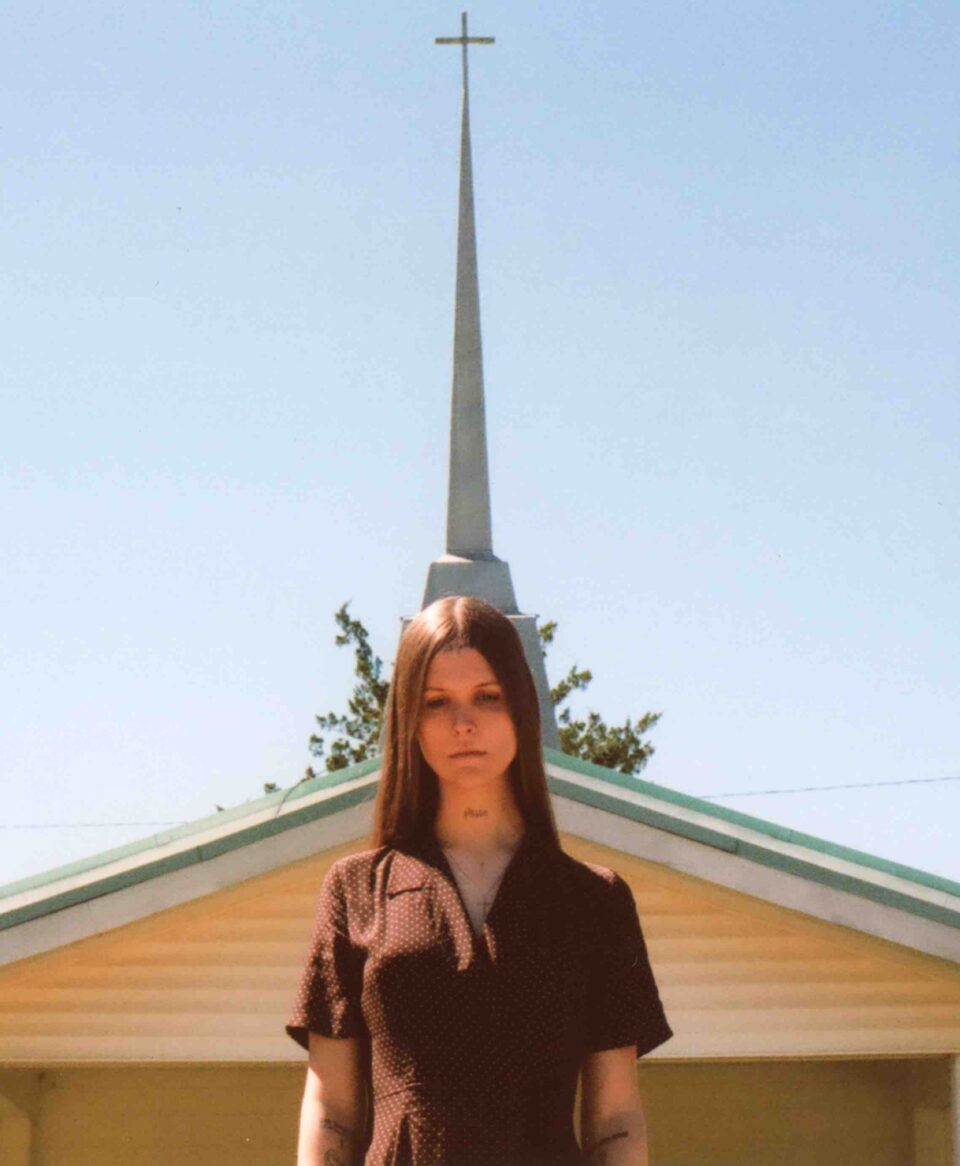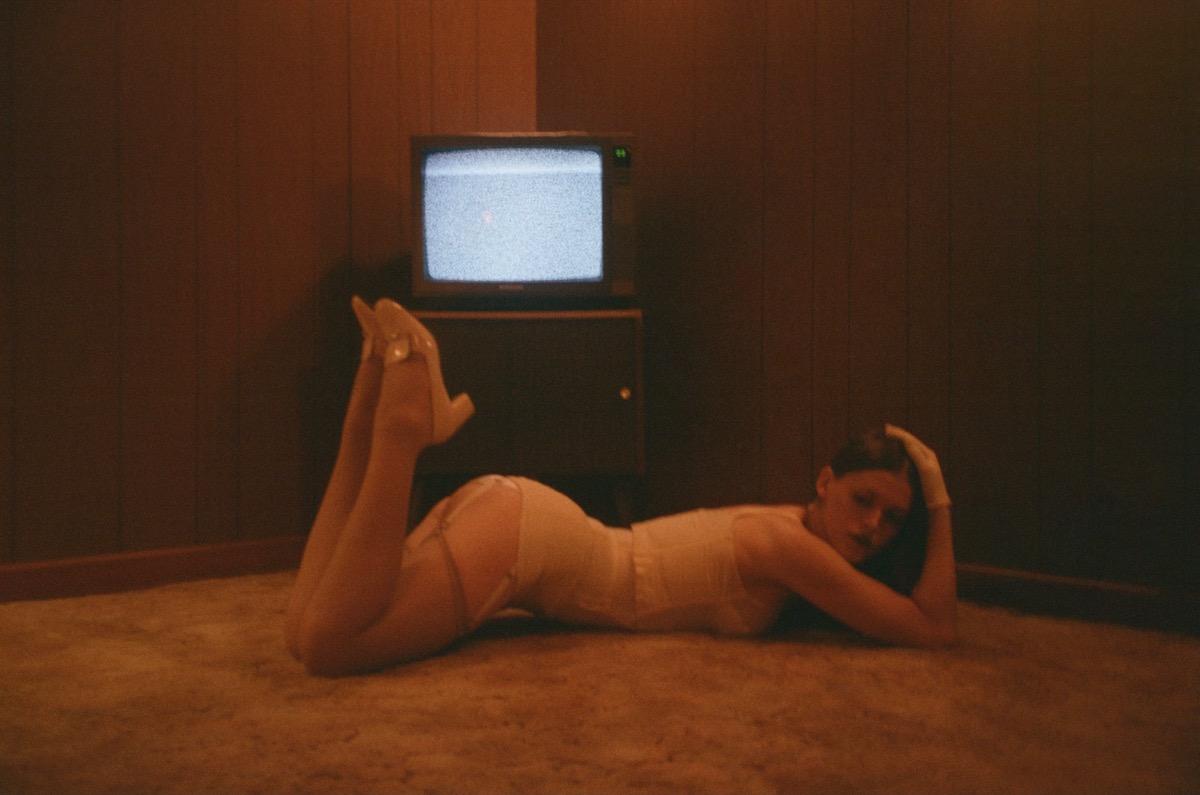Ethel Cain is calling from I-40, from behind the wheel of a pickup truck she’s driving back to her home in southern Alabama after a weekend at her boyfriend’s place in Missouri. The windows are up so the noise doesn’t drown out the Zoom call, but she gives off the impression of someone with the wind in her hair. The landscape streaming past the driver’s side window is verdant and bland, the kind of scenery that lines most major highways in the Eastern United States and slides straight off the eyes of most people driving through. Hers dart around through the windshield, taking in every detail. “Wow,” she says as her eyes lock on something outside camera range and widen. “That’s a beautiful church.”
“So much to see,” she says, dreamily, as she watches it pass. “So many sights.”
Driving a pickup truck across the parts of Middle America that most people don’t think about, with a face specked with tattoos, a head full of poetry, and a man hundreds of miles behind her on the Oklahoma line is exactly like something a girl from an Ethel Cain song would do. Her heroines are tragic, mystical figures who grew up indoctrinated in the cult of the American Dream and are coming of age in its crumbling ruins. They’re girls from nowhere towns who know they’re never going anywhere else, ones who entwine their fates with nihilistic, pill-popping country boys just for something to do. Girls whose entire cosmology consists of their daddy and Dale Earnhardt. Girls who show up at church drunk.
Ethel Cain is all of them and more: Southern Gothic chanteuse, white trash drug casualty, preacher’s daughter gone bad. She’s an avatar that Florida-born singer-songwriter Hayden Anhedonia created during her late teens as a crash test dummy for her worst impulses. “All of my hardest lessons that I have to learn, I put her through in a way,” she says. “I always call her my cautionary tale, because she's the version of me that doesn't get it, that doesn't get better, that doesn't break the cycle. She gives in to her anger and her fear and it crushes her. Because I don't want that to happen to me.” Anhedonia compares her to the child in Ursula K. LeGuin’s “The Ones Who Walk Away From Omelas,” who’s kept imprisoned, in unending anguish, so that the rest of the city above can live in a blissful utopia.
“All of my hardest lessons that I have to learn, I put [Ethel Cain] through in a way. I always call her my cautionary tale, because she’s the version of me that doesn’t get it.”
Ethel Cain exists in a different world from most young artists gaining traction today, and not just because Anhedonia lives in a tiny town in the rural South. She has little interest in—and, in fact, little patience for—the fame chasing and status flexing that have become endemic everywhere in the social media age. “I spend a lot of time in my truck,” she says. “Sometimes I'll pull over to a gas station just to sit in the back of my truck and drink a water and people watch. You know, you go to LA or you get on Twitter, you just see the same things over and over, you kind of watch the same people that you follow do the same thing. There's so many other people, so many other things going on in the world at all times. And it's like, you know, if I had my way, I would see it all before I die.”
Anhedonia is one of the few notable artists working right now who’s interested in life in the rural parts of America that have absorbed some of the worst of the nation’s 21st-century traumas, from the opioid crisis to the endless wars to the overall decline in quality of life. Her new debut album, Preacher’s Daughter, is arena-sized Southern Gothic for the end of the American Empire, taking the deep-rooted themes of thwarted dreams, pent-up sexuality, and Bible-thumping Christian zeal that have always animated Southern art and literature, and grafting on the existential anxiety and nihilism that are coming to define the generation that was raised in the aftermath of 9/11. It’s a vivid, tempestuous dive into the darkest corners of the American psyche; you can almost taste the shitty backwoods coke and hear the Trump 2024 flags snapping in the wind. It’s also, somewhat improbably, a pop album.

Pop music is escapist by nature, but as one global crisis after another has piled up over the past few years, it’s become even more pointedly so. New release playlists serve up a relentless stream of hypercapitalist fantasies, recipes for high-risk drug interactions, and songs about going to the club to forget about how bad things are—as if even acknowledging what’s going on in the outside world will spin us out of control. Cain’s songs, on the other hand, sit with ache and loss in an almost Buddhist way. They’re uncomfortably intimate with addiction and disappointment and how pragmatic you get when you have a limited number of options in your life and they’re all equally bad. “Good men die too,” goes the chorus to “Crush,” her 2021 breakout single, “so I’d rather be with you.”
“You go to LA or you get on Twitter, you just see the same things over and over. There’s so many other things going on in the world at all times. And it’s like, if I had my way, I would see it all before I die.”
Four years ago, Anhedonia was working on “a dark electronic project” when she found a piano loop buried in a sample pack she’d downloaded that whisked her away mentally to a wheat field in the middle of nowhere. “It was like a bell had been struck in my head,” she recalls. “I could see it so clearly.” She sat down and wrote an aching, desperate ballad called “A House in Nebraska,” which is now the third track on Preacher’s Daughter, in 10 or 15 minutes. She thought the dream-pop/Americana hybrid might be the start of a new side project, but her obsession with the song quickly pushed aside the project she’d been working on for months. “It was a major turning point in my life,” Anhedonia says. “I was going down a path of being consumed by all these dark and evil things that I was interested in and terrified by, and I just was not happy with my life. And then when I wrote that song, I was just like, God, it was like a breath of fresh air.” A month or two later she bought a replica Gunne Sax prairie dress off of Etsy, and something clicked.
In the short time since, Ethel Cain has developed into one of the most interesting characters in pop music, mostly by ignoring the rules of popstar behavior in 2022. Instead of designer leisurewear or runway-couture costumes, she’s usually seen in either ultra-modest country-preacher’s-wife dresses, vintage pinup lingerie, or various combinations of RealTree camo and NASCAR memorabilia, intentional costuming that covers a century-plus of rural white American femininity. Her music, which Anhedonia writes and produces herself, isn’t beat-heavy or even often very danceable, unless you count swaying around in a spacy, half-disassociated way. She serves the occasional grinding, Weeknd-via-Salem fuck jam or excursion into noisy electronic psychedelia, but her best songs explore an idiosyncratic and trend-averse blend of classic rock’s rangy muscularity, dream pop’s narcotic atmosphere, the soaring emotionality of praise music (which Anhedonia calls a “good old Southern Baptists brainwashing technique”), and ’90s-era Celtic New Age textures. In their most ecstatic moments—and there are a lot of them—her songs sound like Enya trying to recreate Bruce Springsteen’s The River through a klonopin haze.
But despite the dark atmosphere she conjures, Anhedonia knows how to deliver all of the pleasures good pop songs are supposed to give. “Crush,” “Michelle Pfeiffer,” and “American Teenager” are all built around massive, transcendental hooks that can sweep you up in them, flinging you into clouds of pure pop bliss. And there’s never been a shortage of (mostly) girls with a weakness for swoony, seductive music about how good it feels to feel bad, a population that’s only growing as a better tomorrow for today’s youth seems increasingly unlikely. Over the past couple of years they’ve been flocking to Cain, forming an intensely dedicated grassroots congregation that’s helped land her spots on major playlists, a role as Spotify EQUAL Ambassador, and the attention of some of the most influential names in pop music.
“I was going down a path of being consumed by all these dark and evil things that I was interested in and terrified by, and I just was not happy with my life. And then when I wrote [“A House in Nebraska,”] it was like a breath of fresh air.”
Her fan base’s dedication and rapidly swelling numbers have given Anhedonia a considerable amount of freedom to do things her way. On top of writing, performing, and producing her own songs, she’s also her own video director, stylist, photographer, and social media director. In between hooky pop songs she releases things like “The God,” a six-minute ambient electronic doom track with an Argento-esque self-directed video where she crawls around a church altar in bondage gear and sky-high fetish heels. By the time pop super-producer Dr. Luke signed her to his Prescription Records label for her 2021 EP, Inbred, she’d already put together all of the major pieces of her aesthetic and career herself, and she seems to have resisted any outside attempts at steering her. (She says that she and Dr. Luke, who the pop queen Kesha has accused of sexual abuse, have met in person just once.) She wrote and produced Preacher’s Daughter herself, recording it in her bedroom and a small studio in a residential neighborhood in Toronto, with zero big-name guests on either side of the mixing board.
“Life is such an adventure, and freedom is terrifying. The fact that you can do whatever you want is really scary, because you’re like, ‘What do I do next?’ And now I’m just like, whatever the fuck I want to do.”

Despite what her last name implies (it’s a Greek-derived psychological term that means “inability to feel pleasure”), Anhedonia is a happier person than Ethel Cain, but they still share a lot in common. She grew up in a cultishly religious Southern Christian family, with a mother who tried to shield her from secular pop culture and a father who’d play her Lynyrd Skynyrd and the Steve Miller Band. Her living spaces feel like film sets, full of carefully arranged knick knacks that mix her love of old-time religion and mass-produced redneck aesthetics. She’s impulsive, and prone to bouts of spontaneous cross-country road trips. A few years ago she moved from Florida to rural Indiana, where she didn’t know a single other person, to live in a deconsecrated countryside church she found on the internet.
“I kind of just do what I want as I feel like doing it, you know, when it feels right in the moment,” she says. “Sometimes I get up at 3 a.m. and drive to another state. Life is such an adventure, and freedom is terrifying. The fact that you can do whatever you want is really scary, because you're like, ‘Well, what do I do now? What do I do next?’ And now I'm just like, whatever the fuck I want to do.”
Right now, what she wants to do is turn Ethel Cain into a full-blown pop star, even if she remains skeptical—or maybe just pragmatic—about the entire idea. “Nobody ever gets exactly what they want. That's not realistic.” There are a few things she’d like to get, though: a house somewhere quiet where she can retire, a way to keep creating on her own terms until then, and the chance to keep exploring the persona she’s birthed. “I just love to not even write her story, just kind of let the story unfold naturally, as I grow with her.” FL







